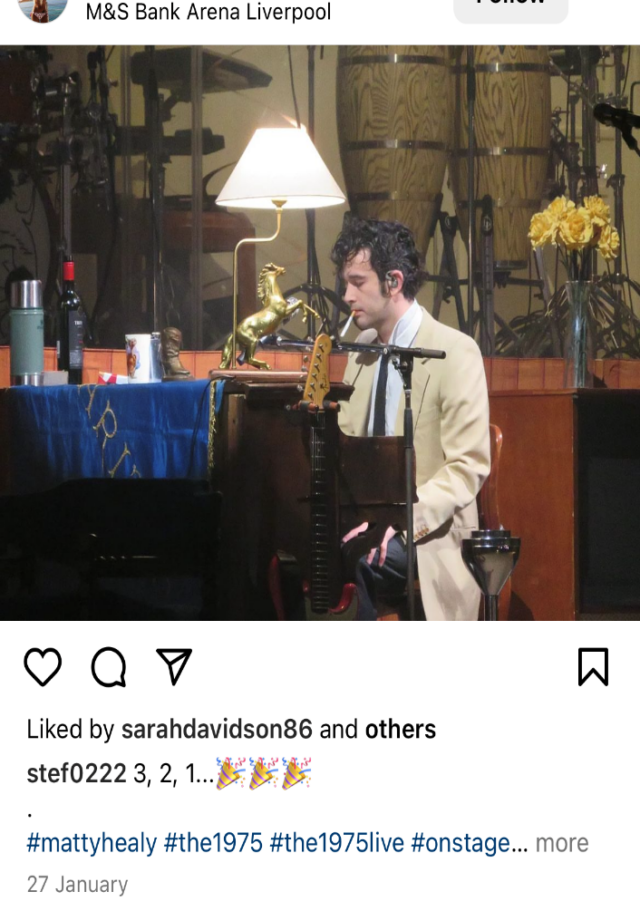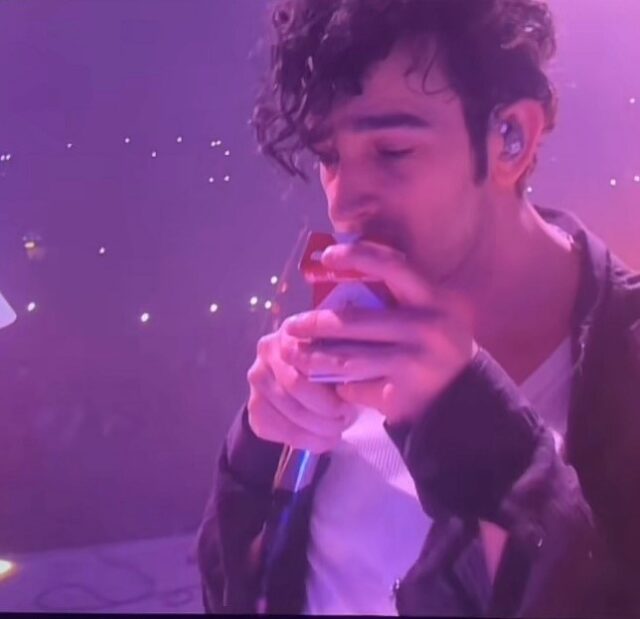Alexander Barker
We know that there are tobacco references in music and in the image portrayed by musicians, often associated with themes of rebellion. Smoking content in the media is a causal factor in experimentation and uptake by young people, likely due to social learning. Furthermore, the tobacco industry has previously attempted to target ‘hip’ music events to sell cigarettes: For example, Camel cigarettes shifted marketing tactics in the 1990’s to target the hipster persona through events such as promotional music tours.
The 1975 are an English pop-rock band formed in 2002. In 2022 and 2023 they were touring to promote their latest album. Their first performance was in November 2022 at Madison Square Garden, which was filmed for Amazon Prime. They promoted the album in the UK throughout January 2023.
I attended their gig at the Nottingham Arena, a closed arena, in Nottingham, England on the 22nd January. Within the first couple of minutes, the lead singer lit up a cigarette on stage, and this was followed by predominantly younger-appearing members of the audience doing the same.
The show was split in two parts, the first half of which appeared to be portraying, and set out in a similar fashion to, a sit-com set in a house and was arguably therefore more of the theatre performance. In the second half the band played all of their greatest hits. The lead singer smoked throughout both parts. On stage there was a packet of Marlboro reds with the distinctive red and white chevron design (See figures 1 & 2). On the Amazon Prime recording of the show in the US, however, a packet of Camels is seen instead.


Why were branded packets without health warnings used in the UK? Good question. Whilst it is an offence to sell a branded packet in the UK, smoking from a branded packet is not an offence. Nevertheless, both the smoking and the branded packaging are normalising this behaviour on stage and in front of fans. The Framework Convention on Tobacco Control recommends a ‘comprehensive ban on advertising, promotion and sponsorship would reduce the consumption of tobacco products’. The UK does not allow tobacco advertising anywhere, including on tobacco packaging, and it does not permit smoking in indoor public places. There are exemptions to the smokefree legislation which state that ‘Where the artistic integrity of a performance makes it appropriate for a person who is taking part in that performance to smoke, the regulations allow for parts of premises in which a person performs to be not smokefree in relation to that person only during the time of the performance’. This exemption has been criticised as it puts smokers in the audience on ‘nicotine alert’ and could be harmful to audience members’ health. Where the regulations ban smoking outright such as in Scotland, performers need to get creative, for example trading cigarettes for cups of tea, or removing content due to threats from local councils to shut down production. However, in England artists are aware that they are permitted to smoke due to the artistic integrity clause. Given the play-like nature of the first half of the 1975 show, it could be argued that the lead singer was playing a character who smokes, but this does not explain the continued smoking in the second half of the show which did not appear to be a characterisation. Perhaps now is the time to assess whether such exemptions are justified, particularly when the activities on stage are influencing behaviour in the crowd which is not covered by exemptions.
Research shows that exposure to smoking content in the media can influence young people to smoke, especially seeing an influential person engaging in this behaviour. I saw first-hand how this influenced the audience and it is not something I expected to see in 2023. This content is likely to reach a large audience through the live shows, and the recording available on Amazon Prime. In addition, it appears that a large number of images and videos are circulating on social media to predominantly young viewers. Many of these are captioned with the hashtag #dontlikementhols due to a viral meme from the band’s tour, in which the lead singer states ‘Don’t throw menthols on the stage, we don’t like menthols’, implying that fans even throw cigarettes on to the stage during the live show. To date the hashtag has had 28.3 million views on TikTok.
Young people are once again being exposed to branded packaging and smoking promotion through influential figures, benefitting the interests of the tobacco industry. While no evidence has emerged that any tobacco companies are involved in or aware of this promotion, this needs to be explored further. If artists are again being paid to promote use of the single most deadly consumer product in history, as they were in the past it is concerning. If they are doing it for free, it is even more disappointing.
Dr Alexander Barker is a Lecturer in Psychology at the College of Health in Psychology and Social Care Department at the University of Derby, UK.
Funding Statement
No funders were involved in this research.